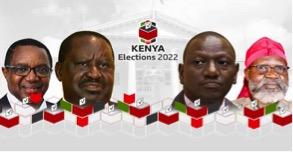Press Freedom Under Threat in Kenya’s 2022 Presidential Elections
Submitted by fkakooza on

Threats against journalists surfaced in the Kenyan presidential elections of 2022 despite strides the media had made to cover them in an objective, balanced and fair manner.
The electoral process was associated with various threats to press freedom. The presidential candidates included David Mwaure Waihiga of Agano Party, Prof. George Wajackoyah of the Roots Party, Raila Odinga of the Azimio coalition, and the eventual winner, William Ruto, of the United Democratic Alliance (UDA).
The press was at different occasions denied access to voting areas and to election data, particularly the results from the Independent Electoral and Boundaries Commission (IEBC) servers for live transmission. The IEBC justified its decision to block some journalists from accessing the results portals, saying several unauthorized individuals had gained access to the system and had tried to manipulate the results.
“There were numerous attempts to download Form 34C, which is used to announce the winner of presidential elections,” the African Center for Media Excellence (ACME) quoted the IEBC chairperson, Wafula Chebukati, as having said.
There were also reports of online trolling of, and in some cases, physical attacks on journalists. According to the Media Council of Kenya (MCK), at least 43 journalists from various media houses were affected in 12 reported incidents. Of these journalists, 37 were denied access to designated polling and tallying centers, while the rest were arrested, received threats, and endured various other forms of harassment.
In March 2022, two journalists were assaulted at Chungwa House, the Azimio headquarters, where they had gone to cover an event at which Odinga’s party was welcoming Kajiado governor, Joseph Ole Lenku. Security men roughed up and assaulted The Standard’s Moses Nyamoni and The Star’s Luke Awich. Elsewhere, UDA barred journalists from covering the delegates’ resolutions in March, where Ruto, the coalition’s flag bearer, was crowned at Kasarani indoor arena. This was a violation to the right to seek, receive and impart information.
The Kenya Kwanza alliance, a political coalition consisting of UDA and other parties, that was backing Ruto labeled certain media houses as hostile. This created an antagonistic environment for the coverage of elections after the coalition labeled and attacked journalists for allegedly favoring its opponents.
“The top leaders who are complaining about the bias would not attack the journalists. It’s their supporters who, taking the cue from leaders, would begin to point at journalists, perhaps to attack them. And the journalists are not quite ready to deal with election-related attacks. We have a group of young journalists,” says William Oloo Janak, chairman of the Kenya Correspondents Association.
From the gender perspective, female journalists avoided covering political rallies because of the unfavorable environment. Judie Kaberia, executive director of the Association of Media Women in Kenya (AMWIK) and a former reporter who covered elections between 2007 and 2017 for Capital FM, says female journalists face unique challenges during elections, as crowds often treat them as sexual objects in blatant violation of their rights and freedom.
“… It happened to me while reporting a political rally in the past election. You’re holding a microphone and someone is pinching you on the back, [while] another one is touching your bosom. It has been so normalized that we don’t see it as a crime, and even if we report it, nobody takes it seriously,” Kaberia says.
The role of media in elections and in promoting democracy has been a subject of interest, especially in emerging nations. The nature of the media environment is equally of interest, as this has an impact on journalists’ ability to hold duty-bearers and elected officials accountable on fulfilling their legal mandate, upholding their oaths of office, fulfilling their campaign promises and carrying out the wishes of the electorate.
- 480 reads
